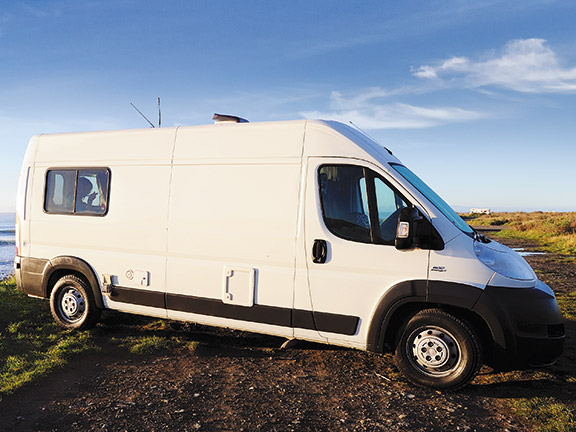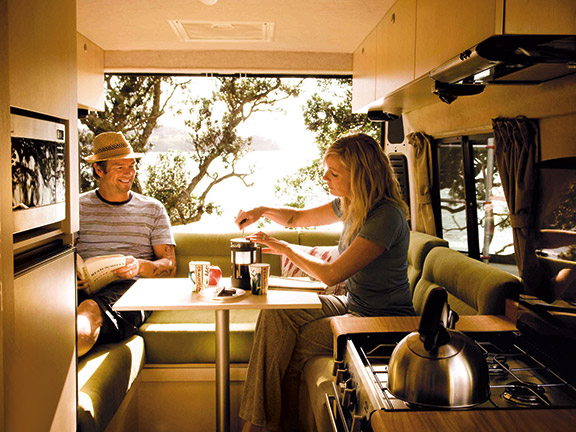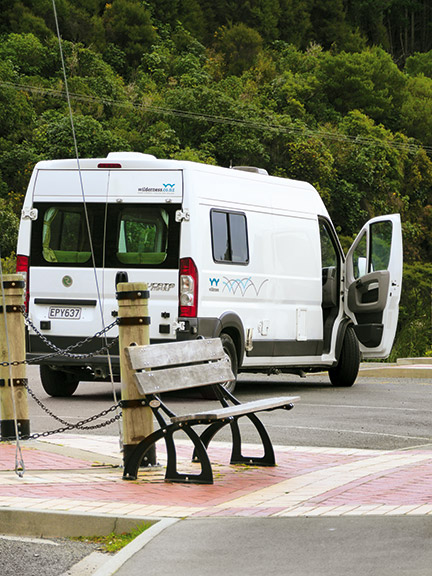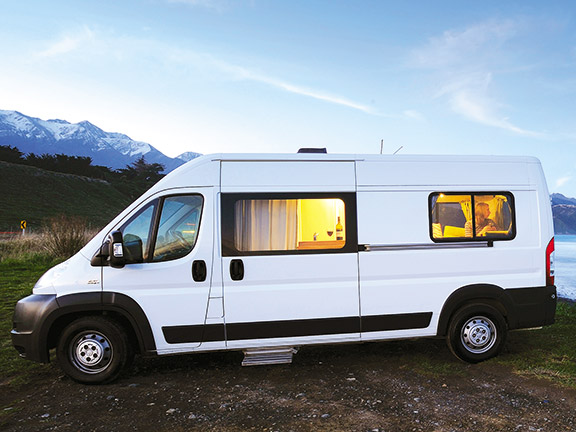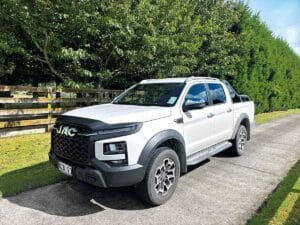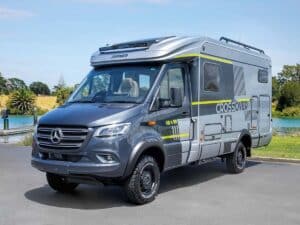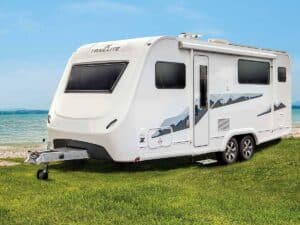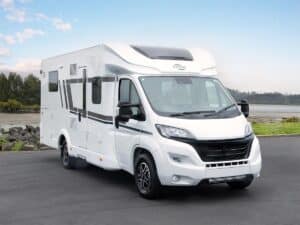In April 2008, MCD's Lawrence Schaffler reviewed RoadCraft's BaseJumper. For some reason, that test stayed in my mind. For those who missed it, Lawrence said it was targeted at “those looking for a little more zing in their holiday: people who enjoy skiing, snowboarding, rock climbing, mountain biking, paragliding, fishing — whatever pushes their buttons”.
Those who know me will readily testify that skiing, snowboarding, rock climbing, mountain biking, paragliding, and fishing do not feature in my travel plans. Although, I do not mind a little more zing than perhaps the average holidaymaker. I quite like a bit of zip as well.
In short, I like a vehicle with a lot of get up and go and all the bells and whistles. I like compact and cosy, and no shortage of creature comforts — no matter how rugged the surrounding terrain becomes. And, after spending three winter nights in the South Island putting this vehicle through its paces, I do like the BaseJumper.
Speed-reader that I am, I didn't initially realise this vehicle was just six metres in length. This elusive fact was immediately understood by the co-pilot and relayed to me in words of three syllables and less so I could grasp the concept. Simply put, this was to be the smallest vehicle we had taken away to date.
I am not one who believes size is everything (I am, after all, just 155cm tall) but the idea of spending three winter days in the South Island in a very compact space began to play on my mind. How cosy is too cosy when the temperature plummets and cabin fever rises?
As fate would have it, Christchurch turned on one of its wide-sky winter days for our scheduled pick up from Wilderness Rentals near the airport. Wilderness is the rental arm of Smart RV, which is selling off the remainder of its fleet of BaseJumpers to concentrate on stocking Bürstner vehicles.
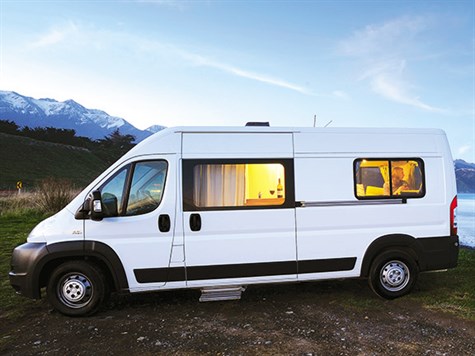
Bedrooms and lounge
My first impression of the BaseJumper was how airy and spacious it seemed. The big welcome card was the moss-green, U-shaped rear lounge which looked super comfy. This was not a false promise, either.
Wilderness believes a good night's sleep on the road is of paramount importance and ensures all its vehicles measure up. The BaseJumper's queen bed (1900 x 1500mm) is exceptionally comfortable and easy to make up with the table top and one other small board slipped into place.
The table top is very sturdy and we would endeavour to recreate it with lightweight materials if we owned this vehicle. That said, the table for two was easy enough to put up and take down and its swivel function meant we could move with ease between the sofa and the galley. Overall we found few problems skirting each other as we moved around the 'van, although it is certainly true I could lose a few pounds to facilitate this.
Kitchen and bathroom facilities
I loved the galley. Yes, a metre less than we were used to was noticeable when it came to the preparation area; but a wooden board over the sink and a glass-topped stove was adequate compensation — especially as everything is within easy reach.
My love affair with the four-burner Spinflow gas cooker and grill will be forever burned into the co-pilot's mind as I may have been guilty of mentioning it enthusiastically once or twice.
The generous 80-litre, 12-volt Engel fridge and freezer and arm's reach across the galley was also embraced. Hot water is courtesy of a 14-litre Truma gas heater that also operates on 240 volts.
The bathroom/drying room is a stroke of genius — perfectly attuned to requirements of the target market of young and agile adventure travellers, but also appreciated by old fogies.
Ready to take off the grid
In a vehicle that boasts a very well-insulated shell to keep condensation at bay, the 2.2 kilowatt diesel heater also vents through the bathroom floor to create a cosy and practical drying room. According to the seller, the diesel heater costs around 30 cents to run for the first hour and, as the air heats up, the cost decreases. The diesel heater can also be used while driving.
Given it was the dead of winter (well, the shortest day, anyway), the warm dry interior was well appreciated — especially at Marfells Beach where we were buffeted during the night by a cool wind coming in across Cook Strait.
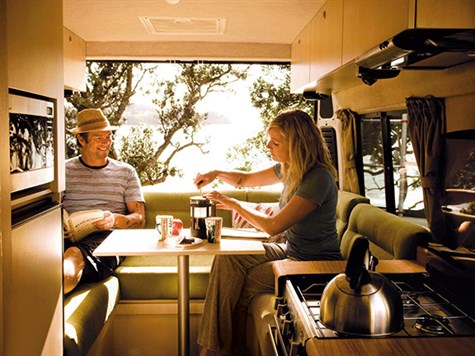
With the length of darkness far outweighing that of daylight hours, we also had ample opportunity to assess the lighting and gave it a thumbs up. The BaseJumper's comprehensive electrical package includes an easy-to-read power board, ample sockets and chargers, and a 600-watt inverter. The vehicle is fitted with two 220-amp-hour, deep-cycle, six-volt house batteries (making 12 volts) and a conventional 12-volt start battery for the engine.
The BaseJumper is built on a Fiat Ducato Maxi chassis. It is front-wheel drive with a 2.3-litre, four-cylinder diesel and six-speed manual gearbox. The motorhome drives like a car, with its 120hp engine offering 320Nm of torque or, in layman's terms, plenty of power for passing and climbing. The fuel tank capacity is 90 litres, with average fuel consumption expected to be around 10 kilometres per litre.
Interior comforts continue through into the cab design with height-adjustable steering wheel, bucket seats, air conditioning, and a CD/radio player with controls on the steering wheel. Good surround vision makes driving a pleasure. And when you need to stop, powerful ABS brakes will pull you up safely.
We had no complaints about the amount of storage on offer. The large boot could easily absorb plenty of toys and accessories, and internal storage is plentiful, with loads of locker space and additional under-seat storage.
The verdict
During the three days we undertook a return journey to Christchurch via Marlborough Sound, giving us plenty of time for appraisal as we put it through its paces. We found it to be more than adequate for our needs and, at the journey's end, we concluded the pluses of the shorter vehicle far outweighed the minuses.
This campervan is for sale through Smart RV. It has been fully refurbished and is ready to go, with cutlery, crockery, and kitchenware, as well as camping table and chairs included. At the time
of writing there were 10 vehicles in stock, each with around 290,000 kilometres on the clock.
Purchase price is $44,900.
For the latest reviews, subscribe to Motorhomes, Caravans & Destinations magazine here.

